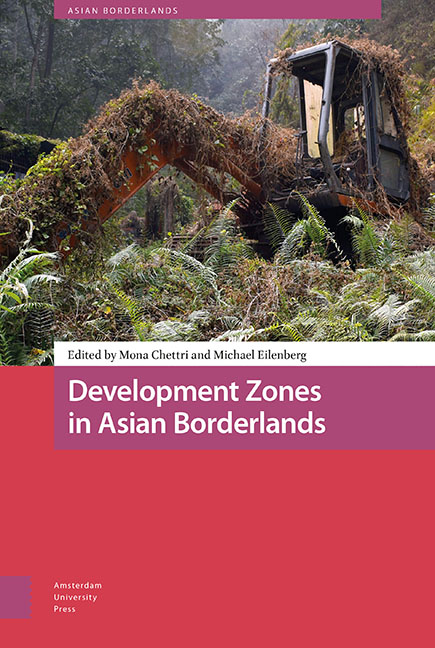Book contents
- Frontmatter
- Contents
- List of Figures and Tables
- Acknowledgements
- Introduction: Enclave Development and Socio-spatial Transformations in Asian Borderlands
- 1 Post-disaster Development Zones and Dry Ports as Geopolitical Infrastructures in Nepal
- 2 Onwards and Upwards: Aerial Development Zones in Nepal
- 3 Casinos as Special Zones: Speculative Development on the Nation’s Edge
- 4 Thinking the Zone: Development, Climate, and Heterodystopia
- 5 From Shangri-La to De facto SEZ: Land Grabs from “Below” in Sikkim, India
- 6 Development Zones in Conflict-Affected Borderlands: The Case of Muse, Northern Shan State, Myanmar
- 7 Smart Enclaves in the Borderland: Digital Obligations in Northeast India
- 8 Post-Disaster Economies at the Margins: Development, Profit, and Insecurities Across Nepal’s Northern Borderlands
- 9 Development from the Margins: Failing Zones and Suspended Development in an Indonesian Border Village
- 10 From Boom to Bust – to Boom Again?: Infrastructural Suspension and the Making of a Development Zone at the China-Laos Borderlands
- 11 Genealogies of Extraction: De Facto Development Zones in the Indonesian Borderlands
- Notes on Contributors
- Index
1 - Post-disaster Development Zones and Dry Ports as Geopolitical Infrastructures in Nepal
Published online by Cambridge University Press: 18 June 2021
- Frontmatter
- Contents
- List of Figures and Tables
- Acknowledgements
- Introduction: Enclave Development and Socio-spatial Transformations in Asian Borderlands
- 1 Post-disaster Development Zones and Dry Ports as Geopolitical Infrastructures in Nepal
- 2 Onwards and Upwards: Aerial Development Zones in Nepal
- 3 Casinos as Special Zones: Speculative Development on the Nation’s Edge
- 4 Thinking the Zone: Development, Climate, and Heterodystopia
- 5 From Shangri-La to De facto SEZ: Land Grabs from “Below” in Sikkim, India
- 6 Development Zones in Conflict-Affected Borderlands: The Case of Muse, Northern Shan State, Myanmar
- 7 Smart Enclaves in the Borderland: Digital Obligations in Northeast India
- 8 Post-Disaster Economies at the Margins: Development, Profit, and Insecurities Across Nepal’s Northern Borderlands
- 9 Development from the Margins: Failing Zones and Suspended Development in an Indonesian Border Village
- 10 From Boom to Bust – to Boom Again?: Infrastructural Suspension and the Making of a Development Zone at the China-Laos Borderlands
- 11 Genealogies of Extraction: De Facto Development Zones in the Indonesian Borderlands
- Notes on Contributors
- Index
Summary
Abstract
Economic activity is central to development zones and represents a core dynamic from which a host of other relationships radiate outwards. While economic logics consistently motivate and produce the development of such zones, the resultant activities are always much more than economic. That is, the development of development zones also sets in motion new configurations of political power and socio-spatial domination. Following this line of thinking, this chapter examines the proliferating development of new import-export dry ports in the Nepal-China borderlands to understand how geopolitical relationships are grounded, localised, and reconfigured through infrastructural projects. Taking Nepal's post-disaster development landscape as both a point of departure and site of inquiry, I show that the making of development zones in post-disaster environments accomplishes interrelated objectives of state-led territorialisation and economic expansion across a range of social and spatial scales.
Keywords: disaster, infrastructure, geopolitics, dry ports, China, Nepal
Introduction
In recent years, accelerated modes of transport and flexible border regimes have led to the formation of new development zones across the Nepal-China borderlands. Particularly in Himalayan spaces of Nepal's Rasuwa and Sindhupalchok districts, massive dry ports are being constructed to consolidate and transfer the import of Chinese commodities from the People's Republic of China (PRC) into Nepal. While a torrent of Chinese goods accumulates in warehouses and cargo lorries in close proximity to the Nepal-China border, Nepali exports to China remain little more than a trickle. Resonating this stark contrast in import-export volumes, popular conversations across Nepal about trade with China articulate a distinct moment of new Sino-Nepali relations. This discourse was remarkably advanced in October 2019 with Xi Jinping's state visit to Nepal, where twenty Memoranda of Understanding (MOU) were signed between representatives of Kathmandu and Beijing. These agreements indicate a gravitational shift in bilateral state development projects for the Himalaya region and an unprecedented commitment that links infrastructure systems to bureaucratic institutions across Nepal’s northern districts.
Economic activity is central to development zones and represents the core dynamic from which a host of other relationships radiate outwards. While economic logics consistently motivate and produce the development of such zones – and particularly so in borderland spaces, as demonstrated throughout this volume – the resultant activities are always much more than economic. That is, as new development zones are assembled, new socio-spatial relationships also take shape across a range of scales.
- Type
- Chapter
- Information
- Development Zones in Asian Borderlands , pp. 33 - 54Publisher: Amsterdam University PressPrint publication year: 2021



